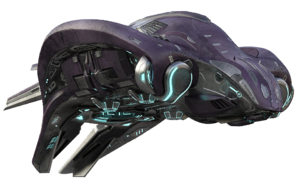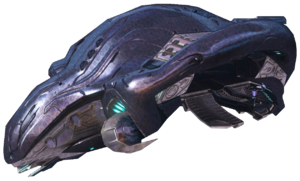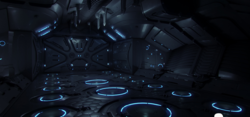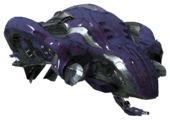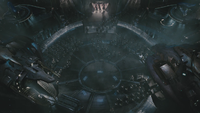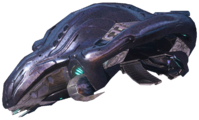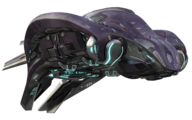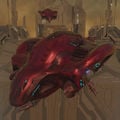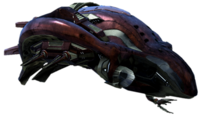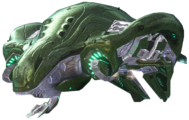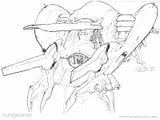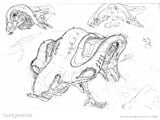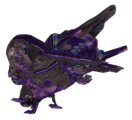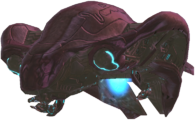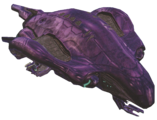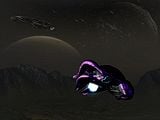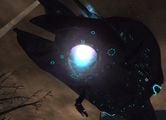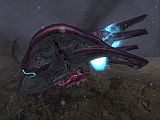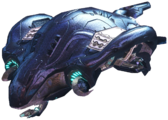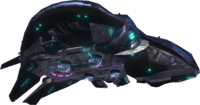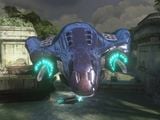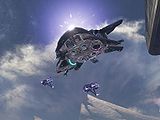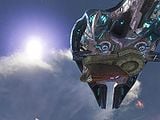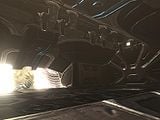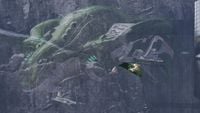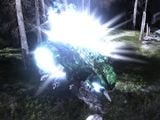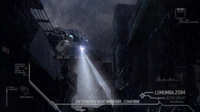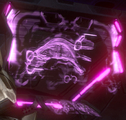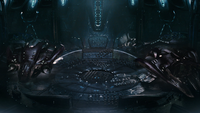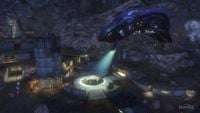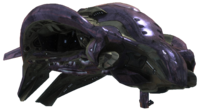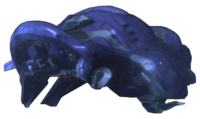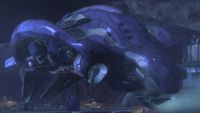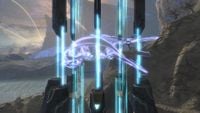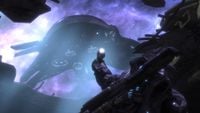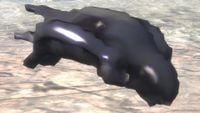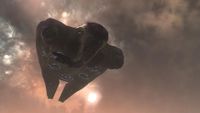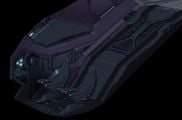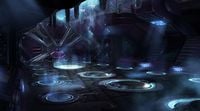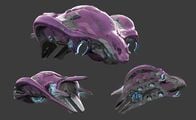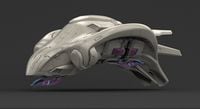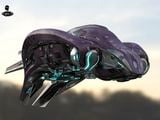Kez'katu-pattern Phantom
From Halopedia, the Halo wiki
| Type-52 Troop Carrier | |
|---|---|
| Production information | |
|
Manufacturer: |
|
|
Class: |
Type-52[2] |
|
Role: |
|
| Technical specifications | |
|
Length: |
33.4 metres (109 ft 7 in)[3] |
|
Width: |
20.5 metres (67 ft 3 in)[4] |
|
Engine(s): |
Twin impulse drive system[5] |
|
Slipspace drive: |
Not equipped |
|
Other system(s): |
|
|
Armament: |
|
|
Complement: |
|
|
Crew: |
Pilot, co-pilot, navigator, operations officerTemplate:Fact |
| Chronological and affiliation | |
|
Era: |
|
|
Introduced: |
At least January 8, 2552[9][5][Note 1] |
|
Affiliation: |
|
The Type-52 Troop Carrier, more commonly known as the Phantom by UNSC forces, is a troop carrier and gunship in service with the Covenant.[4] They are used primarily as troop transports, flying into combat zones and deploying infantry while providing suppressing fire. The Type-52 Phantom is one of the primary dropships in service with the Covenant.[2] Introduced into the final year of the Human-Covenant War, the Type-52 Phantom was created by Assembly Forges to replace the earlier Type-44 Phantom as its improvement over it in every way.[5][Note 1]
The Type-52 Phantom is the most well-known of Phantoms among the humans, with its lustrous silhouette being marked in minds of wars survivors from the Fall of Reach and Battle for Earth though many Covenant forces never used it before the loss of High Charity that effectively ended its production.[5]
Specifications
Design details
The hull of a Phantom is nearly invincible to small-arms fire, although explosives can easily damage or destroy the dropship.[4] The Type-52 Phantom is primarily composed of a curved central hull that features a closed operator cabin in the front and a twin impulse drive propulsion system that feature pivotal fins to control the direction of the thrust at the back of the Phantom.[5] On either side of the dropship lie bay doors that can be sealed for exoatmospheric environments. At the bottom of the Phantom, there is a ventral gravity lift that is able to tow and carry vehicles to and from destinations or deploy passengers. The gravity lift and bay doors were created to allow quick and simple infantry deployment in nearly any terrain type or environment.[2] A ramp is also attached to the dropship to allow passengers to simply walk off when the Phantom has landed.[14] An intruder countermeasure system is also found on Phantoms.[15]
One of the Covenant's primary dropships, the Type-52 Phantom is capable of both infantry transportation and deployment in atmospheric and exoatmospheric environments. Despite being larger than the more traditional Type-25 Spirit, the Phantom is notably more maneuverable—capable of gracefully steering and weaving through tightly-cropped environments like narrow gorges, caverns, or urban centers such as a city with ease.[2] The Phantom is roughly equivalent to the D77-TC Pelican in terms of function and performance. Phantoms are more heavily armed than the Type-25 Spirit dropship, sporting three defensive weapons that offer 360-degree turning radius.[4]
Crew and complement
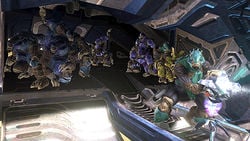
The Phantom crew consists of a pilot, a co-pilot, a navigator, and an operations officer who is in charge of the defensive automatic heavy plasma cannons. The Phantom can carry from as little as sixteen to as much as thirty "standard" passengers in its troop bay, depending on the personnel size of each model of the Type-52 Phantom.[2] Generally, passengers are deployed from the ventral gravity lift and from the doors located by either of the dropship's large side doors. However, due to their size, Mgalekgolo soldiers are deployed from the Phantom through the use of its gravity lift.[4] They have also been seen to transport teams of Huragok, which are carried in cases and swing from the Phantom's underside.[16]
Like the Spirit dropship, the Phantom is capable of carrying a variety of Covenant vehicles such as two Type-32 Ghosts or a single Type-26 Wraith or Type-46 Spectre, as well as essential equipment such as deployable lookout towers, and components of anti-aircraft batteries by utilizing its gravity lift.[4][2]
Armament
Although Phantoms are rarely deployed in a gunship role, they are equipped with a large armament.[2] The Phantom has several armor and armament configurations that vary depending on the model.[4] Typically, Phantoms have a single heavy plasma cannon located underneath its nose and twin, with two side-mounted Type-52 plasma cannons attached to the dropship’s open bay doors.[2][17] These plasma cannons are often operated by Unggoy soldiers. A second model replaces the heavy plasma cannon with a fully automatic one.[10] Another model is armed with three separate, automatic, fully rotational heavy plasma cannons.[4][6]
Variants
Cannon configurations
Several other models of Phantoms with cannon configurations exist, although they are essentially the same in both design and function. The troop capacity and armament of a Phantom varies depending on its model.[2]
- Semi-automatic cannon configuration – Almost similar to the older Type-44 Phantom, these Phantoms are armed with a single heavy plasma cannon that has a slow rate of fire but an explosive effect upon impact, similar to a Type-50 Concussion Rifle.[17] They were extensively deployed during the Fall of Reach and later during the Battle of Installation 04.[18]
Type-52 Phantoms picking up numerous Unggoy troops inside Sanctity of Purification's hangar bay. Note them being somewhat larger by comparing to Banshees and Covenant soldiers.
- Automatic cannon configuration – Although this variant is similar to Phantoms armed with one semi-automaic cannon in terms of design model, these Phantoms are armed with a fully automatic heavy plasma cannon that has a faster rate of fire than that of a Phantom armed with a semi-automatic cannon but a less explosive effect upon impact, and they fire blue-colored shots, unlike other Phantom models. They were introduced around January 8, 2552[9] and prominently used by the Prophet of Truth's forces and also by the Fleet of Sacred Consecration during the Battle for Earth and later the Battle of Installation 00.[10]
An armada of Phantoms leaving Ariel shortly after Operation: FIRESIDE.
- Cannon trio configuration – More armored than other Phantom models, these Phantoms are armored with three separate automatic heavy plasma cannons with a rate of fire even faster than other variants.[6] However, it is unknown if they have any opening troop bays like most other Phantom models as they appear to be never used,[6] but it may be still possible that troop bays of this variant can open.[5][19] They were notably deployed during the Battle for Earth and Installation 05 and the Great Schism.[6]
A pair of Type-52 Phantoms over Threshold gas mine. Note these dropships having more reddish color and share almost the same design of the Type-44 Phantom.
Phantom gunboat
- Main article: Phantom gunboat
An exoatmospheric combat variant of Phantom outfitted exclusively for space-based engagements, known as the Phantom gunboat, swaps its Type-52 plasma cannons for four plasma turrets mounted around the hull, and a chin-mounted heavy plasma cannon. While similar in design to the default Phantom, the gunboat is significantly larger in size and is equipped with energy shielding for missile deflection.[20][21]
Retribution Phantom
The Fleet of Retribution used customized Phantoms following the Great Schism.[22] These Phantoms were similar in function and appearance to the "normal" Phantom model, but they were colored an iridescent green instead of the usual purple,[4] likely to match the UNSC's vehicle color schemes shortly after allying with humanity against the Jiralhanae-led Covenant during the Battle for Earth and Battle of Installation 00. These Phantoms were equipped also with cloaking technology, something rarely seen on ships of their size.[23] After the Covenant's defeat, Type-57 Phantoms were used instead and the green color was replaced with a red color to match the color scheme of Swords of Sanghelios infantry.[24] By 2558, at least one green-colored Phantom was used by Kig-Yar pirates on Ven III, which may indicate that this dropship may be a original Phantom used by the Fleet of Retribution and have been fallen into their hands.[25]
A green-colored Phantom on Ven III in Halo: Escalation. Note the dropship being based on a model of a Type-44 Phantom.
Identified Phantoms
- Glorious Advance - Used for a boarding action against the Infinite Succor.
Gameplay
The role of the Phantom is to transport squads of Covenant troops and vehicles into a combat zone with speed and efficiency. While the T-25 "Spirit" Troop Carrier serves primarily as a dropship, the Phantom, with its heavier armament, also fills the role of a ground support gunship. As their hull is heavily reinforced, Phantoms are invulnerable to small arms fire. The Phantom has three defensive weapons, making it a more challenging adversary than the Spirit. Like the Spirit, the Phantom is mostly scripted to deploy troops and leave, sometimes without coming to a halt, though in rarer cases it may stick around to lay siege on the player.
In Halo 2, the Phantom is invincible and can not be destroyed, although its weapons can be taken out, forcing it to retreat. The two silver engine plates can also be destroyed, although it will have no effect on the Phantom's speed. In Halo 3, Halo 3: ODST and Halo: Reach, the Phantom's three guns, the side doors and platforms, the engine plates, and its hind flaps, as well as its entire well being, are destructible. The Phantom's rear is most susceptible to damage, although this weakness was removed in Halo: Reach. When destroyed, the Phantom will float down, emit sparks and a loud whirring noise, then explode into wreckage, although in Halo: Reach the Phantom simply explodes.
Tactics
- Taking down a Phantom is tempting to do so in Firefight or Campaign; however, it is unwise to do so if there are Phantoms traveling in groups, as they might pin you down with their plasma guns or in the most extreme cases, kill you.
- It is recommended to destroy the Phantom's armaments before taking it out, otherwise they may pin you down.
- If possible, stay under the Phantom and shoot at the drop-off zone where Covenant jump off. You can get a few easy kills with that. However, be wary of the plasma guns.
- Use a heavy weapon to destroy a Phantom. A Spartan Laser, the Warthog's LAAV guns, or a Rocket Launcher or a Fuel Rod Gun will do the trick.
- With heavy weapons like the Rocket Launcher or a Spartan Laser as well as mounted vehicle weapons like the Scorpion tank's cannon or an M68 Gauss Cannon.
- Aim for the twin engines (the silver parts on its front), as those are its weak points. However, the weak points are removed as of Halo: Reach.
Changes
Changes from Halo 2 to Halo 3
- The Phantom is now destructible, vulnerable to heavy weapons and explosives. Nevertheless, it is very durable and able to take up to six shots from a Scorpion tank.
- The Phantom's hull is now a medium-dark violet in Halo 3, rather than magenta as it is in Halo 2.
- The Phantom's flight noise has been reduced from a loud buzzing to a low hum but the overall tone is pretty much the same.
- The Phantom fires shots that are now a blue color, rather than a vivid red.
- The Phantom can deliver troops by opening side doors, not just by the gravity lift.
- The Phantom no longer has three separate auto-cannons - they now have one chin-mounted auto-cannon, and two Type-52 Plasma Cannons on either side of the troop bay.
- The troop bay is open on both sides where the plasma turrets are and it is fully accessible by the player as they can leap into it before it takes off. The player is usually killed when the Phantom hits a death barrier.
- The main cannon's rate of fire is slower.
- The two upper tail-like parts in the rear of the Phantom appear smaller.
- A green-colored variant is introduced. The Fleet of Retribution variant is used by the Elites and has the ability to camouflage itself.
Changes from Halo 3 to Halo 3: ODST
- The wreckage from its destruction is smaller to compensate for the Xbox 360's hardware capabilities.
- The Phantom can carry Engineers in pod-like cases.
- The Phantom's main cannon is equipped with a searchlight for night missions.
Changes from Halo 3 to Halo: Reach
- The auto-cannon is replaced by a cannon that has a slower rate of fire and has a more explosive effect upon impact, similar to a Type-50 Concussion Rifle.
- The two front engine turbines no longer glow blue.
- There are no longer any "weak points"; it takes the same amount of weapons fire to destroy regardless of hit location.
- When hit by weapons fire, it no longer takes visible damage aside from the chin and side guns being knocked off.
- When destroyed, instead of having an "overload" phase where it drops and then explodes, the targeted Phantom instantly explodes as soon as it takes enough damage.
- Far less debris is left behind when destroyed; only the debris from the chin gun, the Type-52 Plasma Cannons on the sides, and a portion of the cockpit will be left when it explodes. Furthermore, not all Phantoms encountered are destructible.
- The Phantom has more health, capable of withstanding up to five M808C Scorpion shots before exploding.
- A variant outfitted for space combat, called the Phantom gunboat, is introduced.
Production notes
Accoring to Shi Kai Wang, when Halo 2 began it's development, Bungie was in the mindset of improving on what they learned on Halo: Combat Evolved, in a "box product" mentality. Wang, who didn't liked the Type-25 Spirit's design, wanted to give the Covenant dropship vehicle a more animalistic personality.[26] At first, Wang tried to redesign the Spirit into a curved shape, but after seeing it lacked the Spirit's personality, and functionally proved to be too hard to carry units, the design was discarded.[27] After many attempts, Wang managed to sketch the Phantom's characteristic silhoutte[28], based on the Cobra; the cobra's posture and "wing span" being the inspiration for the Phantom's shape and its curve posture when threatened being the inspiration for the Phantom's ability to carry vehicles.[29]
When the Phantom's base design was done, Wang tried to formulate where the units would deploy from inside the Phantom: originally, he tried units would deploy from the back, but the Spirit's troop deployment method showed it wouldn't be as fun.[30] At the end, Wang came up with the idea of a tractor beam in the Phantom's belly, using the Spirit's holographic tractor beams as a tube, forcing the troops to deploy one by one, allowing players to engage the enemy from any direction.[31] The Phantom's design end up being one of Shi Kai Wang's favourites.[32]
Trivia

|
Browse more images in this article's gallery page. |
- The Sangheili Phantom in Halo 3 resembles Romulan ships from Star Trek in both its lime-green color and its cloaking ability.
- In the E3 2003 Preview of Halo 2, the Phantom does not possess any form of gravity lift and the troops are instead dropped off from the back, similar to a Pelican. The Phantom is also capable of carrying a Spectre or a Wraith by using hooks located under its "belly". It also seemed to have only one Plasma Cannon.
- In Campaign Scoring charts, it counts as both a "Heavy" and a "Giant" vehicle.
- In the trailer for Halo 3: ODST, a Phantom is seen on patrol using two bright searchlights to sweep the streets. Oddly, the lights are located in the exact location as the Phantom's chin-mounted gun, possibly meaning that this Phantom was specifically adapted for patrol or that its gun had a headlight mounted alongside it. In the cutscene where the Rookie receives a transmission from Dare, the Phantom that passes by has a searchlight mounted on the front turret. This headlight feature also appears in Halo: Reach.
- In the Art of Halo, there is a Phantom render for Halo 2 which had its side doors down and sported heavy plasma turrets on them.
- In the Halo Legends short film, Prototype, a Phantom is seen carrying a Wraith inside its troop bay, as opposed to hovering below it. This may be a means to protect the Wraith from being destroyed before it is deployed or it could simply be an oversight made by the artists.
- In Halo: Reach, a player can pilot a Phantom through the Flyable Pelican and Phantom easter egg. Unlike the Pelican, it can be destroyed, though unlike other vehicles it shows no outward indication of damage.
- In Halo: Reach's Firefight mode, the Phantom cannot be destroyed.
- In Halo: Reach's Firefight mode, a well-aimed M41 rocket launcher shot to the Phantom's cockpit can blast out the pilot (a Grunt), killing it and sending it spiraling out of the vehicle. When this happens, the Phantom stops and hovers for a few seconds before falling to the ground. Any personnel that are within the Phantom do not react and are not deployed.
- In Halo 2 Anniversary the cutscene Phantom is purple with the grey underside similar to previous game's Phantoms, in gameplay however the Phantoms are a more reddish colour including on their underside with also a slightly different design that is partially based on Type-44 Phantom in Halo 4.
Gallery
An angled view of the Phantom as it appears in Halo 2.
A Phantom seen leaving a Covenant fleet around High Charity in Halo 2.
A view of the Phantom as it appears in Halo 3.
A Phantom escorted by two Banshees on Installation 00 in Halo 3.
A Fleet of Retribution Phantom activating its active camouflage.
A Phantom, seen through the "eyes" of the Superintendent, using a pair of high-intensity searchlights to sweep the ruined streets of New Mombasa in Halo 3: ODST.
Two Phantoms being loaded with troops in the hangar bay of a CCS-class battlecruiser.
Turnaround reference of the Phantom as it appears in Halo: Reach.
A view of the Phantom in Halo: Reach, on the level Nightfall.
A Phantom being teleported onto the Viery Territory.
A Phantom participating at the Battle of Asźod.
A model of the Phantom for Halo 2: Anniversary.
Phantoms during the Raid on the Threshold gas mine.
List of appearances
Notes
- ^ a b While Halo: Waypoint clearly claims that the Type-52 Phantom was introduced as the successor of the older Type-44 Phantom (properly introduced in Halo 4) in the last year of the war in 2552, this statement, however, may contradict the use of Phantom dropships earlier throughout the Human-Covenant War that were distinctly depicted as Type-52 Phantoms as seen on several products such as Halo Legends films, Halo Wars: Genesis, Halo: Rise of Atriox.
Sources
- ^ Halo: The Essential Visual Guide, page 137
- ^ a b c d e f g h i j k l m n o Halo Waypoint: Phantom (defunct, backup on Archive.org)
- ^ Facebook, Halo Ground Command Covenant Phantom (Retrieved on Aug 21, 2021) [archive]
- ^ a b c d e f g h i j k l Halo Encyclopedia (2009 edition), page 268 (2009 edition); page 281 (2011 edition)
- ^ a b c d e f g Halo Waypoint: Phantom
- ^ a b c d e f g Halo 2
- ^ a b Halo: Escalation, issue #1
- ^ Halo Mythos
- ^ a b Halo: Helljumper
- ^ a b c Halo 3
- ^ Halo: The Thursday War, page 133
- ^ Halo: Spartan Assault - Operation A: Umbra, campaign level Mission 2: The Mirror Mantle Counter-Assault
- ^ Halo: Escalation, issue #2
- ^ Halo: The Thursday War, page ???
- ^ Halo: Mortal Dictata, page 142
- ^ Halo 3: ODST
- ^ a b Halo: Reach
- ^ Halo: Fireteam Raven
- ^ Halo 2: Anniversary: Gameplay, cutscenes and concept arts.
- ^ Halo: Reach, campaign level Long Night of Solace
- ^ Halo: Spartan Assault, Hunt for the Phantom
- ^ Halo 3, campaign level Floodgate
- ^ Halo 3, campaign level The Covenant
- ^ Halo 5: Guardians, campaign level Swords of Sanghelios (level)
- ^ Halo: Escalation#12
- ^ Twitter, Shiek Wang 王峙凱 - (2/8)Like I said earlier, I didn't quite like the Spirit design. When Halo 2 came around, we were all in the mindset of improving on CE, box product mentality. Given that chance, I wanted to give the #halocovenant dropship a more animalistic personality. (Retrieved on Feb 28, 2021) [archive]
- ^ Twitter, Shiek Wang 王峙凱 - (3/8)Initially, I tried redesigning the Spirit with more of a curved shape. As indicated by this sketch here. But it lacked the personality the Spirit already had. So this felt like a half, or step backwards. The curved transport also proved hard to carry units functionally. (Retrieved on Feb 28, 2021) [archive]
- ^ Twitter, Shiek Wang 王峙凱 - (4/8)After many failed attempts to curve the Spirit, I sketched out a promising silhouette. This was the very first sketch of the now Phantom. It finally had a new but interesting personality, AND animalistic. Which animal? (Retrieved on Feb 28, 2021) [archive]
- ^ Twitter, Shiek Wang 王峙凱 - (5/8)The Phantom was based on the cobra. The graceful yet aggressive posture it has, and how it's narrow in the front but broadens out was such a beautiful natural design. That curvature doubled up as the negative space to hold vehicles under it's 'wing span'. (Retrieved on Feb 28, 2021) [archive]
- ^ Twitter, Shiek Wang 王峙凱 - (6/8)Once the feel was set, it was time to figure out the details. If the concave portion can house the vehicles, where do the units come from? I attempted to have units come out the back. But the Spirit already proved 360 engagement was too much fun. (Retrieved on Feb 28, 2021) [archive]
- ^ Twitter, Shiek Wang 王峙凱 - (7/8)Thus the magic tractor beam. Using the same technology as the Spirit holo tractor beams, the Phantom employs it as a tube. But this time to drop units down one by one to be engaged from any which direction, ready for sandbox fun. (Retrieved on Feb 28, 2021) [archive]
- ^ Twitter, Shiek Wang 王峙凱 - (1/8)Let's talk about the #halo phantom design real quick before we go to bed. One of my personal favorite redesigns. (Retrieved on Feb 28, 2021) [archive]
| |||||||||||||||||||||||||||||||||||||
